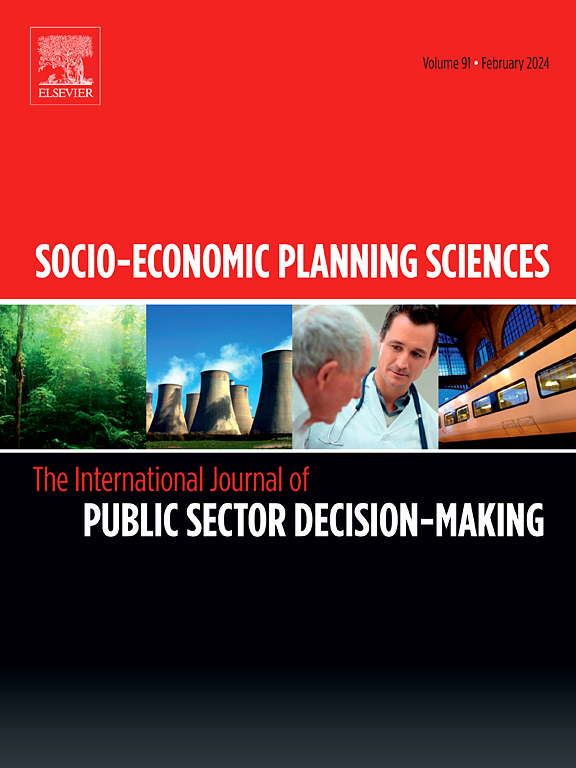An evolutionary multi-stage public-private cooperation framework for emergency supply reserves with corporate reputation considerations
IF 5.4
2区 经济学
Q1 ECONOMICS
引用次数: 0
Abstract
The timely supply of emergency supplies is a critical safeguard for disaster response and post-disaster recovery. With the increasing post-disaster demand for supplies, relying solely on government reserves has become insufficient to meet emergency needs, making collaboration with enterprises an essential solution. However, the specific mechanisms of government-enterprise collaboration in emergency supplies reserves require further investigation. This study employs evolutionary game theory (EGT), integrates corporate social responsibility (CSR), and incorporates reputational benefits into the analysis. A two-stage dynamic game model is constructed to systematically analyze the strategic evolution process and stabilization mechanisms between governments and enterprises during collaboration. The Collaboration Intention Formation (CIF) stage focuses on enterprise participation willingness and its determinants, while the Collaboration Deepening and Optimization (CDO) stage examines the dynamic evolution of government incentive strategies and enterprise cooperation patterns during sustained collaboration. The findings reveal that enterprise participation is directly driven by cost-benefit tradeoffs and indirectly influenced by internal and external factors. Stable and in-depth collaboration depends on the interaction of strategic choices and behavioral feedback mechanisms. Through model-based analysis and numerical simulations, this study identifies key variables influencing equilibrium stability and proposes policy recommendations to optimize emergency supply reserve systems. These results provide theoretical and practical guidance for enhancing the efficiency of government-enterprise collaboration in emergency management.
考虑企业声誉的应急物资储备多阶段公私合作演进框架
及时提供应急物资是应对灾害和灾后恢复的重要保障。随着灾后物资需求的增加,仅仅依靠政府储备已不足以满足应急需求,与企业合作成为必不可少的解决方案。然而,应急物资储备中政企合作的具体机制有待进一步研究。本研究运用演化博弈论(EGT),整合企业社会责任(CSR),并将声誉利益纳入分析。构建了一个两阶段动态博弈模型,系统分析了政府与企业在合作过程中的战略演化过程和稳定机制。合作意向形成(CIF)阶段关注的是企业参与意愿及其决定因素,而合作深化与优化(CDO)阶段关注的是政府激励策略和企业合作模式在持续合作过程中的动态演变。研究发现,企业参与受成本效益权衡的直接驱动,内外部因素的间接影响。稳定而深入的合作依赖于战略选择和行为反馈机制的相互作用。通过模型分析和数值模拟,确定了影响均衡稳定性的关键变量,并提出了优化应急供应储备系统的政策建议。研究结果为提高政府与企业在应急管理中的协作效率提供了理论和实践指导。
本文章由计算机程序翻译,如有差异,请以英文原文为准。
求助全文
约1分钟内获得全文
求助全文
来源期刊

Socio-economic Planning Sciences
OPERATIONS RESEARCH & MANAGEMENT SCIENCE-
CiteScore
9.40
自引率
13.10%
发文量
294
审稿时长
58 days
期刊介绍:
Studies directed toward the more effective utilization of existing resources, e.g. mathematical programming models of health care delivery systems with relevance to more effective program design; systems analysis of fire outbreaks and its relevance to the location of fire stations; statistical analysis of the efficiency of a developing country economy or industry.
Studies relating to the interaction of various segments of society and technology, e.g. the effects of government health policies on the utilization and design of hospital facilities; the relationship between housing density and the demands on public transportation or other service facilities: patterns and implications of urban development and air or water pollution.
Studies devoted to the anticipations of and response to future needs for social, health and other human services, e.g. the relationship between industrial growth and the development of educational resources in affected areas; investigation of future demands for material and child health resources in a developing country; design of effective recycling in an urban setting.
 求助内容:
求助内容: 应助结果提醒方式:
应助结果提醒方式:


